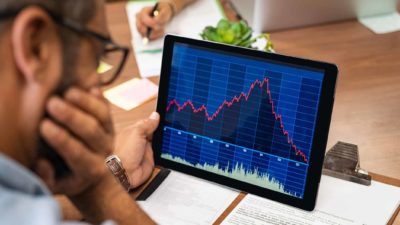The property market could soon follow the S&P/ASX 200 Index (Index:^AXJO) (ASX:XJO) into a bear market even though property values jumped higher in March.
A bear market is defined by a drop of 20% or more from its peak. While most experts interviewed by the Australian Financial Review is predicting a 5% to 10% drop in home values in 2020, some think there's a big risk of a 20% fall.
The dire warning came from AMP Limited's (ASX: AMP) chief economist Shane Oliver. He is forecasting a more than 5% drop in property values this year with a "significant risk" they could fall by 20%.
House prices have peaked
How big the plunge will depend on how long the COVID-19-induced recession lasts. The rapidly spreading pandemic forced the shutdown of most economies around the world as governments restrict business activity to curb its rise.
While the outbreak didn't stop Sydney's and Melbourne's home prices from increasing 1.7% and 0.4%, respectively, last month, CoreLogic noted that from the 16th of March onwards, growth had halved.
The housing market is only at the tip of the downturn when the top 200 stock index crashed 27% since hitting an all time high on 20th February.
Property stocks already suffering
Property stocks are among the worst hit. The Stockland Corporation Ltd (ASX: SGP) share price plummeted 51% over the period, while the Mirvac Group (ASX: MGR) share price and GPT Group (ASX: GPT) share price tumbled around 35% each.
The property tends to move much slower than equities due in large part to the time it takes to buy and sell a property. Whether Australian property follows the ASX into bear territory will depend on how effective the government and Reserve Bank of Australia are at softening the COVID-19 blow.
Banks like the Commonwealth Bank of Australia (ASX: CBA) and Australia and New Zealand Banking Group (ASX: ANZ) are doing their part.
They are freezing loan repayments of struggling mortgagees as they know they have as much, if not more, to lose from a collapsing housing market.
Can't stop the rise in unemployment
But these won't be enough to see a spike in the unemployment rate with economists predicting this will jump to between 7.5% to over 10% from its current level of 5.1%.
The key question in my view is not so much the increase in joblessness, but who loses their job. If this can be confined to younger low skilled workers, this may not pose as big a threat to house prices as the group is unlikely to have a mortgage.
Shares vs. property
This doesn't mean the economy won't shrink as fewer people spend (and low-income earners tend to spend more than they save), but unemployment won't pose as big a direct threat to the property market.
However, it's too early to say with any certainty how far the property market will drop. If I had to guess, I would only say that Australian shares are probably closer to the bottom than house prices.
From that perspective, I know where I would rather put my capital to work.








